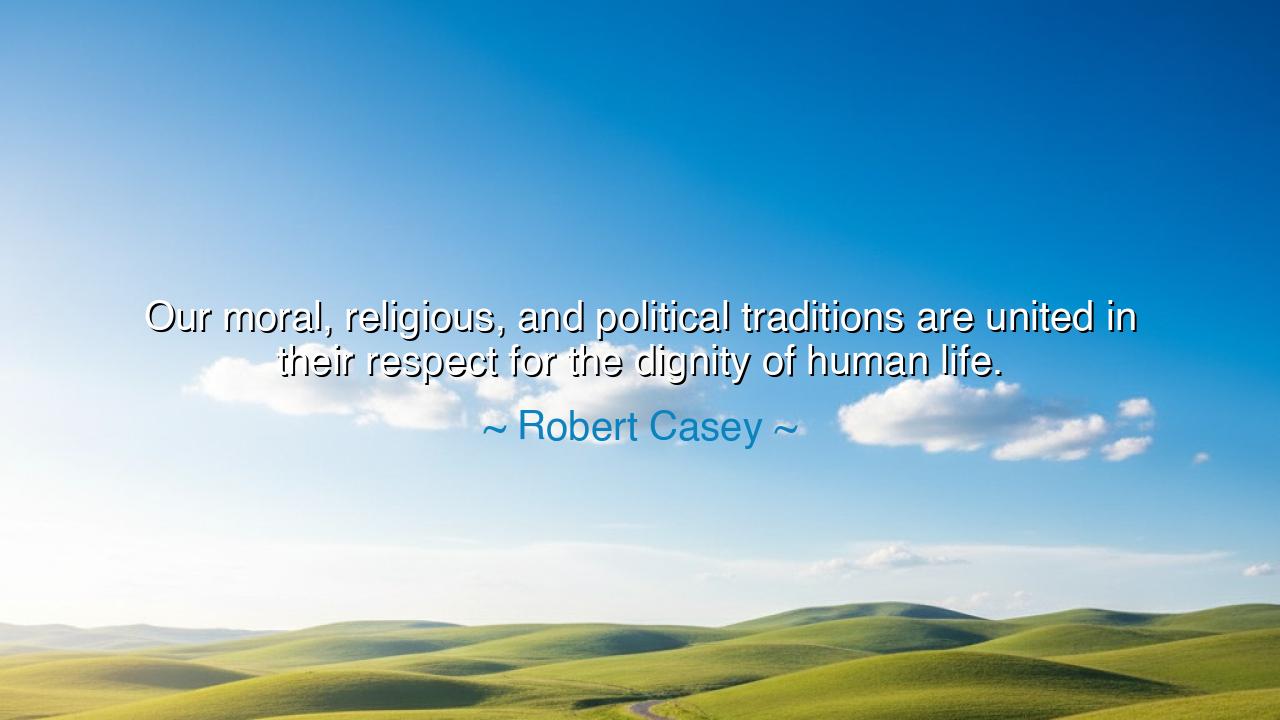
Our moral, religious, and political traditions are united in
Our moral, religious, and political traditions are united in their respect for the dignity of human life.






The words of Robert Casey, “Our moral, religious, and political traditions are united in their respect for the dignity of human life,” strike like a solemn chord, harmonizing the deepest truths that guide civilization. In them, we hear a call to remembrance: that despite our divisions of creed, party, or philosophy, there exists one foundation upon which all lasting societies are built—the dignity of human life. This dignity is not earned by strength, wealth, or position, but flows from the very essence of what it means to be human. Casey’s words remind us that to forget this principle is to unravel the very fabric of morality, faith, and law.
To speak of moral traditions is to call upon the conscience, that inner flame which has always whispered to mankind: do not harm the innocent, do not steal, do not despise your brother. To speak of religious traditions is to invoke the great faiths of the world, each proclaiming in its own tongue the sanctity of life—that man is made in the image of God, that all beings share the same breath, that compassion is the highest law. And to speak of political traditions is to recall the covenants and constitutions, the declarations of rights and liberties, which sought to give outward form to this inner and eternal truth. Casey saw these three—morality, religion, and politics—as strands of one rope, woven to uphold the sacred worth of every life.
The ancients themselves bore witness to this unity. The laws of Hammurabi, the codes of Moses, the writings of Confucius, the dialogues of Plato—all, though born in different lands and tongues, sought to guard life from chaos and cruelty. Their systems differed, their gods bore different names, but beneath the surface burned the same fire: respect for human life as a treasure beyond price. Without such reverence, societies crumble into tyranny or anarchy. With it, even fragile nations may endure.
History offers luminous examples. Consider the abolitionist movement, where men and women from different faiths, parties, and philosophies united against the horror of slavery. Though they disagreed on many points, they stood as one upon the principle that every human life bears dignity that cannot be sold or owned. From William Wilberforce in Britain to Frederick Douglass in America, their voices rang with the conviction Casey later echoed: that respect for life is the one truth that binds every true moral, religious, and political vision.
Yet history also warns of the abyss when this respect is denied. The horrors of the Holocaust arose when a regime rejected the dignity of certain lives, treating them as unworthy of existence. In that darkness, morality was silenced, religion perverted, politics corrupted. From such ruin the world learned again that the denial of human dignity leads to destruction. Casey’s words thus carry not only hope, but warning: if we forget this unity, we risk repeating history’s gravest sins.
The heart of this teaching is both simple and profound: the dignity of life is the cornerstone of civilization. All our laws, all our rituals, all our political systems, find their legitimacy only insofar as they honor this principle. Without it, morality loses compass, religion loses compassion, politics loses justice. With it, even broken systems may find redemption, for the dignity of life has power to restore, to reconcile, and to heal.
The lesson for us is clear: in every debate, in every conflict, in every choice, we must return to this question—does this honor the dignity of human life? If it does, then it is worthy; if it does not, then it must be rejected. This principle can guide us in personal relationships, in community life, and in the shaping of nations. Respect for life must govern not only how we treat those we love, but also how we regard the stranger, the poor, the unborn, the elderly, the marginalized, and even those with whom we disagree.
Practical steps follow. Live with daily reverence for the sacredness of every person you encounter. Speak with kindness, for words too may wound dignity. Act with justice, refusing to exploit or demean others for gain. Support leaders and policies that protect life rather than degrade it. And most of all, guard against the temptation to divide humanity into “worthy” and “unworthy,” for history has shown the devastation such thinking brings.
Thus Casey’s words endure as both a reminder and a mandate: “Our moral, religious, and political traditions are united in their respect for the dignity of human life.” Let them echo in your heart as an ancient law, binding you to honor life in all its forms. For when we live by this principle, we not only preserve society—we preserve the very essence of what it means to be human.






AAdministratorAdministrator
Welcome, honored guests. Please leave a comment, we will respond soon